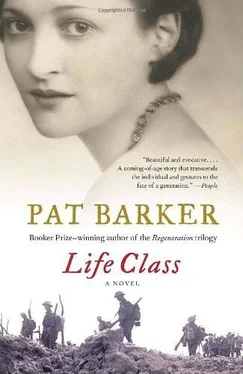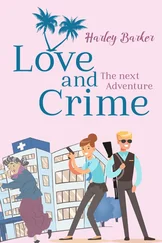It was. As soon as the train appeared the crowd surged forward. If it hadn’t been for Paul, she’d have ended up on the line. As it was she lost a shoe. The guards shouted and blew whistles and yelled at people to keep back, but they were clawing at the sides of the train before it stopped. Paul got on and hauled her up behind him, then had to fight to get off again. She was hemmed in on all sides, her suitcase, or somebody else’s, cutting into her calf. She wasn’t sure her feet were on the ground, even, and she couldn’t see anything except backs and heads and necks. Whistles blew, doors slammed. At the last moment she twisted her head and saw him standing there, one hand raised, and then somebody moved and a shoulder hid him from her sight.
Paul to Elinor
The hospital itself wasn’t bombed, though we have a huge crater a hundred yards away to show how close we came. There’s talk of evacuating us to somewhere further back, but we underlings play no part in such decisions. Lewis and I have both put in for ambulance driving again, and, since we’re supposed to be getting an influx of professional nurses soon, we may succeed. I don’t want to go further back. All the pressure is to go the other way, to be part of it, though I’m sure I shall hate it.
They brought a child in last week, a little boy, ten years old perhaps. It’s not supposed to happen, but the ambulance driver who’d been flagged down at the side of the road by the parents just dumped him here and drove off before anybody could argue. He’d lost both arms. The stumps were curiously like wings. When he tried to move them he looked like a fledgling trying to fly. Even with the morphine he was in terrible pain. His mother visited — she runs a café on the outskirts of the town — I’ve been there once or twice — but they were busy doing repairs so they could open again so she wasn’t here often. One night I was on my way to change his dressings. I pulled aside the screen and found her there, bending over him. She turned round when she heard me, and I apologized and went away. I meant to give them a few minutes alone and then go back, but something else cropped up so it was over an hour before I got back. His mother had gone. He was lying there, alone, with his eyes closed and at first I thought he was asleep, but then I noticed his chest wasn’t moving and when I touched his skin he was growing cold. Everybody said, What a merciful release. Sister Naylor cried. She’d have liked to put flowers in his hands, I think, only of course he had no hands to put them in. Mr Burton, who’d done the operation, was called and like everybody else said, Perhaps it’s just as well. But then, when we were alone — I’d got the job of laying him out — Burton pushed up the child’s lids and said, ‘Look, petechiae.’ (They’re little red spots — haemorrhages — in the whites of the eye.) I didn’t understand. He said, ‘She smothered him.’
It’s strange, isn’t it? You go on and on, or I do rather, seeing God knows what horrors and learning not to care or anyway not to care more than you need to do the job, and then something happens that gets right under your skin. I can’t forget them, the boy and his mother, the look on her face when she turned round and saw me standing there. She had a pillow in her hands. I didn’t realize. What would I have done if I had?
If I don’t get a transfer to ambulance work soon, I think I may have to take some leave.
Elinor to Paul
I wish you would take leave. It would be lovely to see you here and just sit in Lockhart’s having a coffee or go for a meal or back home for toasted crumpets by the fire and … Anything to be together again. I thought seeing you out there would make you feel closer, but it seems to have had the opposite effect. It feels as if you’re in the belly of the whale and I’m out here on dry land. Just. The war impinges a little more each day. The papers are full of atrocity stories, they seem designed to whip up feeling against Germans living here. Catherine feels it very badly.
I missed classes last week. I had to go to stay with my sister. The new baby arrived five days ago, a boy. Mother was in the bedroom trying to take over from the midwife, and then things were going so slowly the doctor had to be called. I walked up and down the corridor outside, standing in for the absent father who’s doing important work in the War Office and couldn’t be spared. Eventually Rache’s cries stopped and I heard the chink of instruments so I thought the doctor must have decided it had gone on long enough. It certainly had — thirty-six hours! — and then there was a cry, a wail rather, and relief all round. I went in to see the baby who had forceps marks on either side of his head, as if he’d been mauled by an animal. Oh Paul, his skin. You know how a poppy looks when you peel the outer green casing back too early? It looked like that: red, moist, creased and then, gradually, it started to fill out. Even a few hours made a difference. Rachel looked shocked. She wasn’t at all the blooming contented mother I’d been expecting. She said labour was the best-kept secret in the world though when I think of some of the noises coming through the bedroom door, I don’t think it can be all that well kept.
At least then we thought, it’s over. But it wasn’t. A few hours later the doctor had to be called back, Rachel was losing so much blood. In fact she collapsed just as he arrived. I think when he walked through the door he thought she was dead. They had to raise the foot of the bed to try to slow the bleeding down. We sat up with her all night and gradually she became a little stronger. Now she can sit up though only for ten minutes at a time. She has to eat raw liver twice a day. I can’t bear to watch her. I go out of the room. You can hear her crying and choking as she tries to force it down.
But the baby’s lovely. I watch the nurse bathe him. When he’s held out over the water there’s a moment when he goes perfectly still. Then the water touches him, and his chin wobbles and he makes little convulsive movements with his arms and sucks his breath in. Of course everybody oohs and ahs, but there’s something terrible about the little naked scrap dangling over the abyss.
It’s been an extremely educational week. I think the role of eccentric maiden aunt will suit me very well. Though I suppose it’s a bit late for the maiden part. I do miss you, Paul.
Did I tell you I’ve almost decided to move? Yes, I know, again. So: more decorating, more buckets of glutinous muck, and no Ruthie to help this time. Doesn’t approve of me any more. She’s volunteered to go out to France and is waiting to hear so can’t be bothered with silly empty-headed people who go on painting while Rome burns. I’ve got to get out of here. Downstairs there are Belgian refugees, grumbling like mad about the food and the weather — which is awful. The rain it raineth every day.
How is it over there? I don’t know what to say about the little boy. How horrible. I hope they let you drive an ambulance soon if that’s what you want, but I’d be even more pleased if you came home on leave.
Toby went off to Scarborough last week on some sort of course, but he had a weekend at home first and saw the new baby. He’s expecting to be sent out early next year. We went for a long walk around all our special places and talked about the future with great determination. After it was over and he was gone I realized my cheeks ached and I couldn’t think why and then I realized it was because I’d been forcing myself to smile for hours and hours.
Barbara — I don’t know if you remember her, she used to go around a lot with Marjorie Bradshaw? — just came in to say she’s been taken on by the Omega workshops, starting after Christmas. Three mornings’ work for thirty shillings a week. She doesn’t mind designing cushions and decorating teapots. I suppose it might be quite fun really, though some people are awfully snooty about it. Prostituting one’s talent, would you believe? They should try teaching flower painting to the young ladies of Kensington. Not that that’s an option any more. I think I might do it too. It leaves you plenty of time to do your own work, and the Slade’s awfully grim at the moment. Tonks sweeping up and down the corridors like the pillar of fire by night.
Читать дальше












